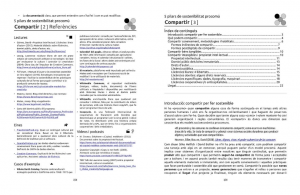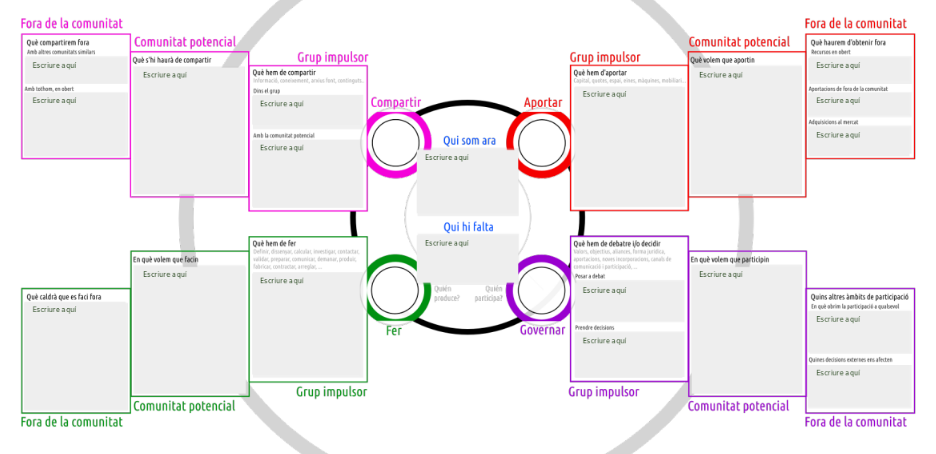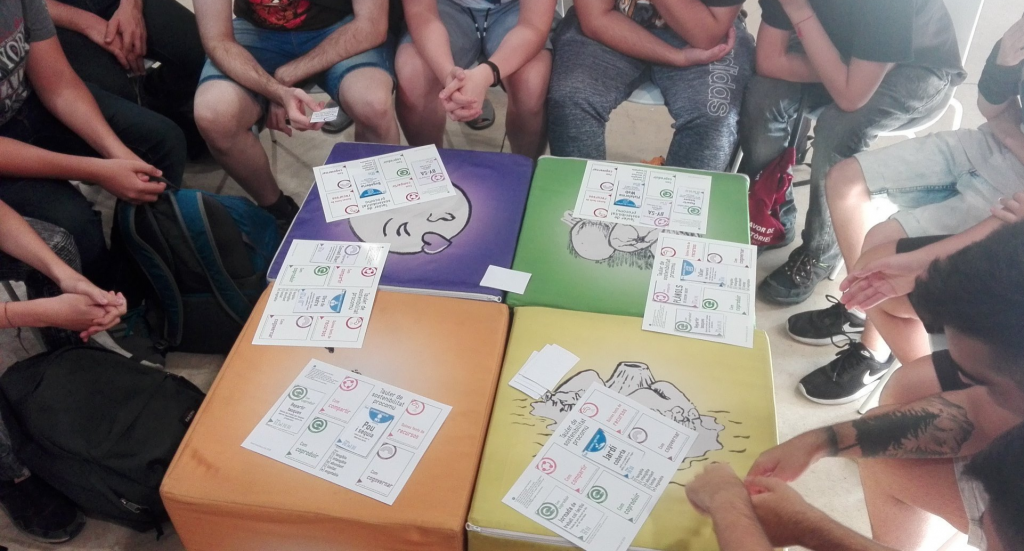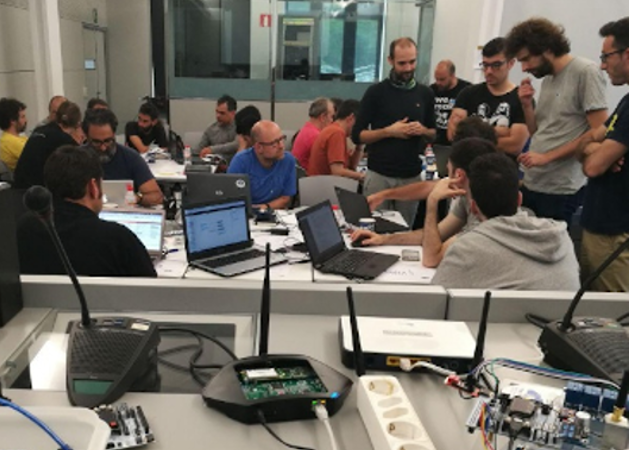This post is also available in: Español (Spanish) English
Col·laborem amb administracions públiques i grans entitats per idear, desenvolupar i executar programes i activitats per ajudar projectes i persones a canviar la mirada, transmetre una visió transformadora de l’economia, reflexionar sobre si en la suposada “nova economia de plataforma” tot és plataformitzable, explorar infraestructures i tecnologies públiques i/o comunitàries, que facilitin donar resposta a les necessitats de les persones, promoure la col·laboració entre projectes front a la competència i el compartir les dades recol·lectades per les plataformes i el seu anàlisi, la informació i el coneixement…
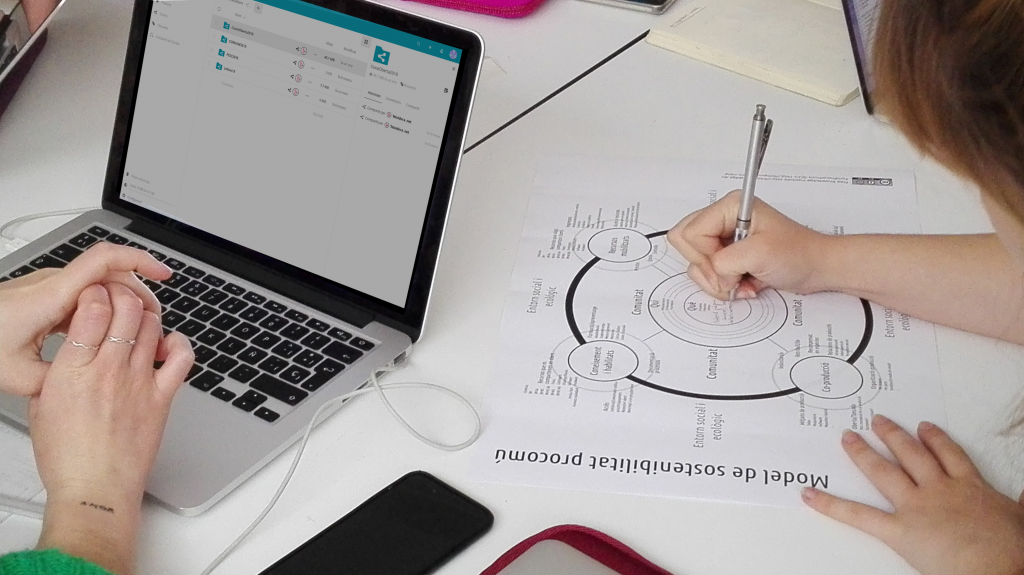 Els programes de transició tenen com a objectiu acompanyar projectes col·laboratius i de cooperació, allunyar-los dels models de competència i extractivistes per apropar-los cap a l’economia solidària i procomú, amb el Model dels 5 Pilars de Sostenibilitat Procomú com a fil conductor.
Els programes de transició tenen com a objectiu acompanyar projectes col·laboratius i de cooperació, allunyar-los dels models de competència i extractivistes per apropar-los cap a l’economia solidària i procomú, amb el Model dels 5 Pilars de Sostenibilitat Procomú com a fil conductor.
Lectura Pilar de Co-governança
Llenços Valors – Nivells de Participació – Forma Jurídica – Obrir
Lectura Pilar de Co-producció
Llenços Qui – Relació activitat i força de treball – Eines de comunicació
Els projectes acompanyats se centren en el procomú, en oposició a les economies extractives que fomenten la creació d’empreses StartUp, sovint sense un model de negoci i que busquen sostenir-se a través de rondes de finançament, d’inversors de risc (business angels) i/o gegants oligopolístics, i que no són sostenibles, ni econòmicament ni pel medi ambient, mentre posen en risc els drets socials. Per això en els programes de Transició no es busca replicar-les fent-ne alternatives en el mercat social, perquè no són replicables i mirar de fer-ho porta directament al fracàs. El que es busca doncs és trobar models alternatius per afrontar els reptes identificats.
Els programes i acompanyaments ofereixen itineraris flexibles i adaptables a les necessitats de cada comunitat i entorn. La seva durada depèn del nombre d’iteracions als 5 pilars del procomú que es valori adequat per a cada moment, des de 3 hores fins a 3 mesos (26 sessions). Vegeu l’exemple de La Comunificadora.
Per implementar un programa escriviu-nos
Per accions específiques consulteu el catàleg Activitats de Transició
Recursos
Lectures
Un paquet amb 6 lectures, d’entre 20 i 30 pàgines, amb un dossier introductori i cinc dossiers per treballar cada un dels 5 pilars de sostenibilitat del procomú, Cada dossier està estructurat amb una petita introducció, els conceptes clau a tenir en compte, casos d’exemple, eines a utilitzar, una bibliografia relacionada i una llista de vídeos recomanats.
Llenços (canvas)
Jocs
Sessions grupals – Activació, cartografiat d’experiències i exploració de sectors
Un cartografiat serveix per mostrar una instantània d’un espai i un moment, i facilitar l’aproximació a la realitat d’un territori, complex i canviant. Serveix per identificar els actors (persones, organitzacions, projectes, experiències,…) que poden ser rellevants (a favor, en contra, o indiferent), per a facilitar una transició al procomú i les relacions actuals i potencials entre aquests actors.
Obertes a tothom, que tenen per objectiu identificar les necessitats d’una comunitat i veure com aquestes poden ser resoltes des d’una perspectiva procomú.
Aquestes accions (de difusió, mapatge de necessitats locals, càpsules per compartir coneixement sobre el territori o sector explorat, mapatge de recursos disponibles) executades en sessions de 4 hores, poden formar part d’una 1a fase del Programa de Transició (i ajudar a preparar els projectes candidats) o realitzar-se de manera independent i tenir simplement un caràcter exploratori o d’agitació per a processos que es desenvoluparan de forma autònoma.
En una o diverses sessions temàtiques (sobre comuns urbans, cultura, oci, mitjans de comunicació, participació ciutadana, barris, coneixement i investigació, consum, finances, medi ambient, agroecologia, economia circular, rural, naturals, feminismes, cures i migracions, fabricació maker, xarxes, internet de les coses, blockchain, …) serviran principalment per explorar aliances entre projectes i recursos existents.
Si es realitzen com a 1a fase del Programa de Transició, les sessions acaben amb una “mentoria en obert” per, amb l’ajuda de persones mentores del programa, acabar de definir les necessitats de la comunitat i posar en marxa el procés de formació i selecció dels equips que participaran en la fase següent.
Dinàmiques de grup – tallers pràctics, tallers socials, hackaton de prototipat,…
En la preparació i facilitació de grups dins de processos de co-disseny transicional cal saber identificar el tipus d’entorn en el qual fer el treball conjunt: una trobada, una jornada, una sessió de feina, una hackató.
Seleccionar bé als diferents tipus d’agents clau per complir amb l’objectiu proposat, saber identificar i crear els espais adequats, tenir capacitat de convocatòria perquè es reservin un temps per participar en la trobada i saber marcar el ritme i la intensitat de l’acció.
Algú (persona o equip) assumeix el paper de la persona facilitadora-mediadora, que ajuda a desbloquejar situacions de confusió o falta de motivació.
Un exemple d’això és una hackató de prototipat. Trobada en el qual són convocades persones amb perfils i experiències diferents per idear un o diversos projectes o avançar en el seu prototipat. De la trobada s’espera sortir amb un projecte definit, alguns aspectes ja resolts i algunes solucions per explorar. El generat en la trobada es publica en obert de manera que pugui ser reutilitzat i aquestes persones o altres poden seguir desenvolupant el projecte.

